| Listing 1 - 10 of 21 | << page >> |
Sort by
|

ISBN: 0896033392 0896033384 1603272593 9780896033382 Year: 1996 Publisher: Totowa (N.J.): Humana press,
Abstract | Keywords | Export | Availability | Bookmark
 Loading...
Loading...Choose an application
- Reference Manager
- EndNote
- RefWorks (Direct export to RefWorks)
In The Protein Protocols Handbook, I have attempted to provide a cross-section of analytical techniques commonly used for proteins and peptides, thus providing a benehtop manual and guide both for those who are new to the protein chemistry laboratory and for those more established workers who wish to use a technique for the first time. We each, of course, have our own favorite, commonly used gel system, g- staining method, blotting method, and so on; I'm sure you will find yours here. H- ever, I have also described a variety of altematives for many of these techniques; though they may not be superior to the methods you commonly use, they may nev- theless be more appropriate in a particular situation. Only by knowing the range of techniques that are available to you, and the strengths and limitations of these te- niques, will you be able to choose the method that best suits your purpose.
Analytical biochemistry --- Proteins --- Protéines --- analysis --- handbooks --- Analysis --- Handbooks, manuals, etc --- Analyse --- Guides, manuels, etc. --- -#WDIR:vfm2 --- Proteids --- Biomolecules --- Polypeptides --- Proteomics --- Mass spectrometry. --- Proteins -- Analysis -- Handbooks, manuals, etc. --- Proteins -- Analysis. --- Proteins. --- Proteomics. --- Handbooks --- Clinical Laboratory Techniques --- Peptides --- Amino Acids, Peptides, and Proteins --- Investigative Techniques --- Publication Formats --- Chemicals and Drugs --- Publication Characteristics --- Analytical, Diagnostic and Therapeutic Techniques and Equipment --- Animal Biochemistry --- Human Anatomy & Physiology --- Health & Biological Sciences --- handbooks. --- Handbooks. --- Protéines --- Life sciences. --- Biochemistry. --- Life Sciences. --- Biochemistry, general. --- Biological chemistry --- Chemical composition of organisms --- Organisms --- Physiological chemistry --- Biology --- Chemistry --- Medical sciences --- Biosciences --- Sciences, Life --- Science --- Composition --- #WDIR:vfm2 --- Proteins - Analysis - Handbooks, manuals, etc. --- Proteins - analysis - handbooks
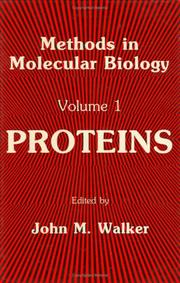
ISBN: 0896030628 1592594883 Year: 1984 Publisher: Clifton Humana Press
Abstract | Keywords | Export | Availability | Bookmark
 Loading...
Loading...Choose an application
- Reference Manager
- EndNote
- RefWorks (Direct export to RefWorks)
In recent years there has been a tremendous increase in our understanding of the functioning of the cell at the molecular level. This has been achieved in the main by the invention and development of new methodology, particularly in that area generally referred to as "'genetic engineering". While this revolution has been taking place in the field of nucleic acids research, the protein chemist has at the same time developed fresh methodology to keep pace with the requirements of present day molecular biology. Today's molecular biologist can no longer be content with being an expert in one particular area alone. He/she needs to be equally competent in the laboratory at handling DNA, RNA, and proteins, moving from one area to another as required by the problem he/she is trying to solve. Although many of the new techniques in molecular biology are relatively easy to master, it is often difficult for a researcher to obtain all the relevant information necessary for setting up and successfully applying a new technique. Information is of course available in the research literature, but this often lacks the depth of description that the new user requires. This requirement for in-depth practical details has become apparent by the considerable demand for places on our Molecular Biology Workshops held at Hatfield each summer.
Molecular biology --- Analytical biochemistry --- Proteins --- Analysis --- Methodology. --- Research --- 577.112 --- -Proteins --- -#WSCH:WBIO --- Proteids --- Biomolecules --- Polypeptides --- Proteomics --- Molecular biochemistry --- Molecular biophysics --- Biochemistry --- Biophysics --- Systems biology --- -Methodology --- 577.112 Proteins --- #WSCH:WBIO --- Research&delete& --- Methodology --- Analysis&delete& --- Life sciences. --- Biochemistry. --- Life Sciences. --- Biochemistry, general. --- Biological chemistry --- Chemical composition of organisms --- Organisms --- Physiological chemistry --- Biology --- Chemistry --- Medical sciences --- Biosciences --- Sciences, Life --- Science --- Composition
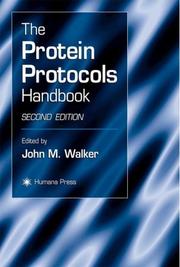
ISBN: 0896039404 0896039412 058540318X 9786610821327 1280821329 1592591698 Year: 2002 Publisher: Totowa, N.J. Humana
Abstract | Keywords | Export | Availability | Bookmark
 Loading...
Loading...Choose an application
- Reference Manager
- EndNote
- RefWorks (Direct export to RefWorks)
From Reviews of the First Edition "...a must for researchers in protein chemistry and especially those with less experience..." -Doody's Health Sciences Book Review Journal "...definitely an indispensable benchtop handbook...highly recommended for all levels of research within the field."-Bioseparation "...a very useful tool for daily work." -Nahrung-Food Since publication of the bestselling first edition of John Walker's widely acclaimed Protein Protocols Handbook in 1996, there have been many highly significant developments in protein biochemistry. This greatly enhanced second edition introduces 60 critically important new chapters dealing with topics and techniques that have emerged since the first edition, as well as significantly updating the remaining articles. The new chapters cover many rapidly developing areas, particularly the application of mass spectrometry in protein characterization, as well as the now well-established 2-D PAGE technique in proteomics. The section on glycoprotein analysis has also been significantly expanded, and methods for the production of single-chain and phage-displayed antibodies have been added to the section on antibodies. Each readily reproducible method follows the highly praised format of the Methods in Molecular Biology™ series, offering a concise summary of its basic theory, a complete materials list, a step-by-step protocol for its successful execution, and extensive notes on avoiding pitfalls, or on modifying the method to function within your own experimental circumstances. The authors are commonly the techniques' originators, and each has demonstrated a hands-on mastery of the methods described, always fine-tuning them here for optimal productivity. Comprehensive, cutting-edge, and highly practical, The Protein Protocols Handbook, Second Edition is today's indispensable benchtop manual and guide-not only for all those new to the protein chemistry laboratory, but also for those established workers seeking to broaden their armametarium of techniques in the urgent search for rapid and still more robust results.
Analytical biochemistry --- Proteins --- Peptides --- Protéines --- analysis --- Analysis --- Laboratory manuals --- Laboratory Manuals --- Analyse --- Manuels de laboratoire --- Biochemistry. --- Life sciences. --- Proteins -- Analysis -- Laboratory manuals. --- Proteomics. --- Science. --- Amino Acids, Peptides, and Proteins --- Molecular Conformation --- Investigative Techniques --- Molecular Structure --- Analytical, Diagnostic and Therapeutic Techniques and Equipment --- Chemicals and Drugs --- Biochemical Phenomena --- Chemical Phenomena --- Phenomena and Processes --- Protein Conformation --- Chemistry Techniques, Analytical --- Human Anatomy & Physiology --- Health & Biological Sciences --- Animal Biochemistry --- Protéines --- Life Sciences. --- Biochemistry, general. --- Biological chemistry --- Chemical composition of organisms --- Organisms --- Physiological chemistry --- Biology --- Chemistry --- Medical sciences --- Biosciences --- Sciences, Life --- Science --- Composition --- Immunology. --- Immunobiology --- Life sciences --- Serology --- Proteids --- Biomolecules --- Polypeptides --- Proteomics --- PROTEINS --- ANALYSIS --- LABORATORY MANUALS

ISBN: 1592598900 1280359315 9786610359318 1423714946 1588293432 1588295931 Year: 2005 Publisher: Totowa, N.J. Humana Press
Abstract | Keywords | Export | Availability | Bookmark
 Loading...
Loading...Choose an application
- Reference Manager
- EndNote
- RefWorks (Direct export to RefWorks)
Proteomics methodology has revolutionized the way that proteins are studied and opened new channels to understanding both cell functions and the cellular changes involved in disease states. In The Proteomics Protocols Handbook, hands-on researchers describe in step-by-step detail a wide range of proven laboratory methods and bioinformatics tools essential for analysis of the proteome. These cutting-edge techniques (73 in all) address such important tasks as sample preparation, 2D-PAGE, gel staining, mass spectrometry, and posttranslational modification. There are also readily reproducible methods for protein expression profiling, identifying protein-protein interactions, and protein chip technology, as well as a range of newly developed methodologies for determining the structure and function of a protein, including novel mass spectrometry and LC-MS techniques, protein array technology, and a variety of structural and functional proteomics techniques needed to determine of the function of newly discovered protein sequences. The use of X-ray crystallography and NMR to determine protein structure is also described. The bioinformatics tools include those for analyzing 2D-GEL patterns, protein modeling, and protein identification. All laboratory-based protocols follow the successful Methods in Molecular Biology™ series format, each offering step-by-step laboratory instructions, an introduction outlining the principle behind the technique, lists of the necessary equipment and reagents, and tips on troubleshooting and avoiding known pitfalls. Timely and highly practical, The Proteomics Protocols Handbook offers molecular biologists, protein chemists, clinical and medicinal chemists, biochemists, and microbiologists a comprehensive collection of today's best tools for understanding not only the function of individual proteins in the cell, but also for identifying new therapeutic targets.
Analytical biochemistry --- Proteomics -- Handbooks, manuals, etc. --- Proteomics -- History. --- Proteomics -- Methods. --- Proteomics --- Biochemistry --- Investigative Techniques --- Genomics --- Chemistry --- Computational Biology --- Analytical, Diagnostic and Therapeutic Techniques and Equipment --- Genetics --- Biological Science Disciplines --- Biology --- Natural Science Disciplines --- Disciplines and Occupations --- Methods --- Human Anatomy & Physiology --- Health & Biological Sciences --- Animal Biochemistry --- Molecular biology. --- Molecular biochemistry --- Molecular biophysics --- Biophysics --- Biomolecules --- Systems biology --- Molecular biology --- Proteins --- Proteomics.
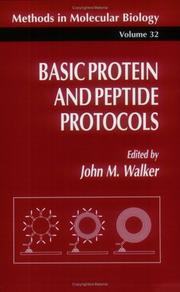
ISBN: 089603268X 0896032698 1592595197 Year: 1994 Publisher: Totowa (N.J.) : Humana press,
Abstract | Keywords | Export | Availability | Bookmark
 Loading...
Loading...Choose an application
- Reference Manager
- EndNote
- RefWorks (Direct export to RefWorks)
Basic Protein and Peptide Protocols offers an excellent collection of reproducible, step-by-step laboratory methods covering three major areas: (1) the quantitation and characterization of proteins, (2) the electrophoretic and blotting procedures used in protein isolation and characterization, and (3) the analysis of protein and peptide structure. THOUSANDS of labs are already using Basic Protein and Peptide Protocols-you should be too!
Proteins --- Peptides --- Analysis --- Methodology. --- Amino Acids, Peptides, and Proteins --- Chemicals and Drugs --- Animal Biochemistry --- Human Anatomy & Physiology --- Health & Biological Sciences --- Methodology --- Moleculaire biologie --- Moleculaire biologie. --- Life sciences. --- Biochemistry. --- Life Sciences. --- Biochemistry, general. --- Biological chemistry --- Chemical composition of organisms --- Organisms --- Physiological chemistry --- Biology --- Chemistry --- Medical sciences --- Biosciences --- Sciences, Life --- Science --- Composition
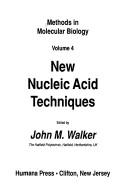
ISBN: 9780896031272 9781592594917 0896031276 1592594913 Year: 1988 Publisher: Totowa, NJ : Humana Press : Imprint: Humana,
Abstract | Keywords | Export | Availability | Bookmark
 Loading...
Loading...Choose an application
- Reference Manager
- EndNote
- RefWorks (Direct export to RefWorks)
Molecular biology --- Nucleic acids --- Nucleotide sequence --- Research --- Methodology. --- Animal Biochemistry --- Human Anatomy & Physiology --- Health & Biological Sciences --- Methodology --- Molecular biochemistry --- Molecular biophysics --- Analysis, Nucleic acid sequence --- Analysis, Nucleotide sequence --- Base sequence (Nucleic acids) --- DNA sequence --- Nucleic acid sequence analysis --- Nucleotide sequence analysis --- RNA sequence --- Sequence, Nucleotide --- Polynucleotides --- Life sciences. --- Biochemistry. --- Life Sciences. --- Biochemistry, general. --- Biological chemistry --- Chemical composition of organisms --- Organisms --- Physiological chemistry --- Biology --- Chemistry --- Medical sciences --- Biosciences --- Sciences, Life --- Science --- Composition
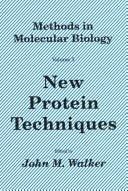
ISBN: 0896031268 9780896031265 1592594905 Year: 1988 Publisher: Clifton Humana Press
Abstract | Keywords | Export | Availability | Bookmark
 Loading...
Loading...Choose an application
- Reference Manager
- EndNote
- RefWorks (Direct export to RefWorks)
577.112 --- Molecular biology --- -Proteins --- -#WSCH:WBIO --- 577.112 Proteins --- Proteins --- Proteids --- Biomolecules --- Polypeptides --- Proteomics --- Molecular biochemistry --- Molecular biophysics --- Biochemistry --- Biophysics --- Systems biology --- Research --- -Methodology --- Methodology. --- #WSCH:WBIO --- Research&delete& --- Methodology --- Biochemistry. --- Biochemistry, general. --- Biological chemistry --- Chemical composition of organisms --- Organisms --- Physiological chemistry --- Biology --- Chemistry --- Medical sciences --- Composition
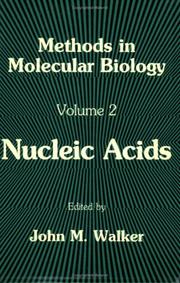
ISBN: 0896030644 9781592594894 1592594891 9780896030640 Year: 1984 Publisher: Clifton (N.J.): Humana press,
Abstract | Keywords | Export | Availability | Bookmark
 Loading...
Loading...Choose an application
- Reference Manager
- EndNote
- RefWorks (Direct export to RefWorks)
In recent years there has been a tremendous increase in our understanding of the functioning of the cell at the molecular level. This has been achieved in the main by the invention and development of new methodology, particularly in that area generally referred to as "genetic engineering". While this revolution has been taking place in the field of nucleic acids research, the protein chemist has at the same time developed fresh methodology to keep pace with the requirements of present day molecular biology. Today's molecular biologist can no longer be content with being an expert in one particular area alone. He/she needs to be equally competent in the laboratory at handling DNA, RNA, and proteins, moving from one area to another as required by the problem he/she is trying to solve. Although many of the new techniques in molecular biology are relatively easy to master, it is often difficult for a researcher to obtain all the relevant information necessary for setting up and successfully applying a new technique. Information is of course available in the research literature, but this often lacks the depth of description that the new user requires. This requirement for in-depth practical details has become apparent by the considerable demand for places on our Molecular Biology Workshops held at Hatfield each summer.
Molecular biology --- Nucleic acids --- Molecular Biology --- Research --- Methodology --- Analysis --- methods --- Methodology. --- Biochemistry. --- Biochemistry, general. --- Biological chemistry --- Chemical composition of organisms --- Organisms --- Physiological chemistry --- Biology --- Chemistry --- Medical sciences --- Composition
Book
ISBN: 1597451983 160327474X 1588298809 Year: 2009 Publisher: Totowa, NJ : Humana Press : Imprint: Humana,
Abstract | Keywords | Export | Availability | Bookmark
 Loading...
Loading...Choose an application
- Reference Manager
- EndNote
- RefWorks (Direct export to RefWorks)
Since the publication of the bestselling second edition of John Walker's widely acclaimed Protein Protocols Handbook, there have been continual methodological developments in the field of protein chemistry. This greatly enhanced third edition introduces 57 critically important new chapters, as well as significantly updating the previous edition's tried-and-true methods. Although the timely new chapters are spread throughout all of the book, the vital section on post-translational modifications has been expanded most to reflect the increasing importance of these modifications in the understanding of protein function. Each readily reproducible method follows the highly praised format of the Methods in Molecular Biology™ series, offering a concise summary of its basic theory, a complete materials list, a step-by-step protocol for its successful execution, and extensive notes on avoiding pitfalls, or on modifying the method to function within your own experimental circumstances. The expert authors of each chapter have demonstrated a hands-on mastery of the methods described, fine-tuned here for optimal productivity. Comprehensive, cutting-edge, and highly practical, The Protein Protocols Handbook, Third Edition is today's indispensable benchtop manual and guide, not only for all those new to the protein chemistry laboratory, but also for those established workers seeking to broaden their armametarium of techniques in the urgent search for rapid and robust results.
Biochemistry. --- Post-translational modification . --- Protein Science. --- Posttranslational Modification. --- Co-translational modification --- Cotranslational modification --- Modification, Post-translational --- Post-translation protein modification --- Post-translational protein modification --- Posttranslation protein modification --- Posttranslational modification --- Posttranslational protein modification --- Genetic translation --- Proteins --- Biological chemistry --- Chemical composition of organisms --- Organisms --- Physiological chemistry --- Biology --- Chemistry --- Medical sciences --- Synthesis --- Composition --- Post-translational modification.
Book
ISBN: 9781603273701 1603273700 9781603273749 1603273743 9786611871345 1281871346 1603273751 Year: 2008 Publisher: Totowa, N.J. : Humana Press,
Abstract | Keywords | Export | Availability | Bookmark
 Loading...
Loading...Choose an application
- Reference Manager
- EndNote
- RefWorks (Direct export to RefWorks)
Recent advances in the biosciences have led to a range of powerful new technologies, particularly nucleic acid, protein and cell-based methodologies. The most recent insights have come to affect how scientists investigate and define cellular processes at the molecular level. Molecular Biomethods Handbook, 2nd Edition expands upon the techniques included in the first edition, providing theory, outlines of practical procedures, and applications for a range of techniques. Part A of the book describes nucleic acid methods, such as gene expression profiling, microarray analysis and quantitative PCR. In Part B, protein and cell-based methods are outlined, in subjects ranging from protein engineering to high throughput screening. Written by a well-established panel of research scientists, Molecular Biomethods Handbook, 2nd Edition provides an up-to-date collection of methods used regularly in the authors’ own research programs. This book will prove to be an invaluable reference for those engaged in or entering the field of molecular biology, and will provide the necessary background for those interested in setting up and using the latest molecular techniques.
Genetics --- Histology. Cytology --- Molecular biology --- Medicine. --- Molecular Medicine. --- Health Workforce --- Molecular diagnosis --- Methodology
| Listing 1 - 10 of 21 | << page >> |
Sort by
|

 Search
Search Feedback
Feedback About UniCat
About UniCat  Help
Help News
News